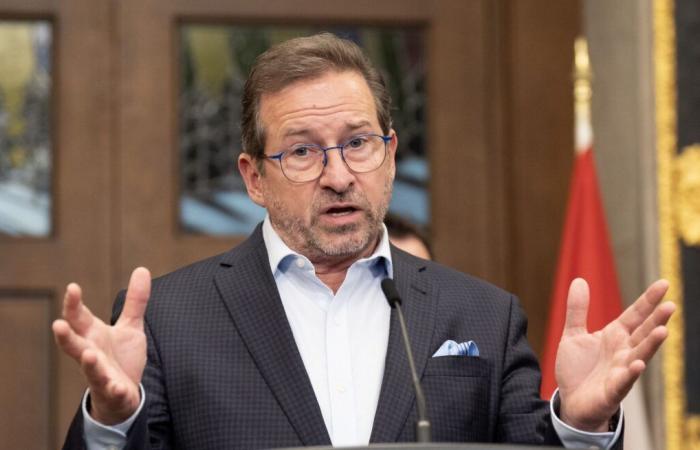
Faced with the very real possibility that the Bloc Québécois would form the official opposition in Ottawa, its leader, Yves-François Blanchet, advocated “a certain modesty”, but judged that it would nevertheless be “spectacular”.
“I stubbornly refuse to consider the election in terms of pride or a trophy or to pretend to be part of history,” he declared in an end-of-year interview with The Canadian Press.
Mr. Blanchet explained that the Bloc has a political offer to make and that “we must deserve the trust” of the population. “Quebecers will give us a mandate, then we will carry it out responsibly, always repeating, I hope, that we must live this with modesty,” he continued.
The most recent projections from the poll aggregator Canada338 almost announce the collapse of the Liberals if elections are imminent.
Pierre Poilievre’s Conservatives would obtain an overwhelming majority with 232 seats, the Bloc would follow — far behind — with 45 deputies. The Liberals would have 39, the New Democrats 25 and the Greens two.
In such a scenario, Mr. Blanchet, at the helm of an independence party that puts forward the interests of Quebec, would become the leader of the official opposition or, formally, of “Her Majesty’s loyal opposition.” He would also get the keys to an official residence in Ottawa, Stornaway.
“If that happens, I can only tell you that we respect the institutions […]while having already said that the Senate should be abolished, that the monarchy in Canada should be abolished, but we are not here to break the toys,” he assured.
Mr. Blanchet affirmed that his party would behave with “a positive and constructive attitude” while reiterating that Quebecers should choose sovereignty.
“We can therefore expect that when an issue affects all of Canada, including Quebec, we will do our job. If a question affects just Quebec, or almost just Quebec, we are exactly in our business. And if an issue only affects elsewhere in Canada, we might be more discreet,” he summarized.
In any case, “yes, obviously”, the Bloc will continue to speak “only in French” in the House of Commons.
What is his message to English Canada? “People don’t have to fear us,” he said. The Bloc positions, for example on gas and oil, are well known and “we are not going to pull an ideological rabbit out of our hat”.
Also, the Bloc leader notes that, “often”, what is “good” for Quebec is also “good” for Canada.
He cites as an example his major battles of the fall: the increase in pensions for seniors aged 65 to 74 – which received 79% of support in the country in a Nanos poll -, the protection of the management of offer in commercial treaties, and the removal of what he describes as a “religious exception” regarding hate speech in the Criminal Code.
“The Worst Threat”
What would Mr. Blanchet choose between a medium-sized Bloc deputation, but which holds the balance of power, or a large Bloc deputation in a majority Parliament?
“That’s an interesting trick question,” he said with a laugh. According to him, the Bloc, which nevertheless wants to elect as many deputies as possible, can do well in both cases.
On the one hand, Mr. Blanchet believes that the balance of power would make it possible to “force issues”, despite having noted its limits in recent years. On the other hand, he judges that “the official opposition is the worst threat to a government”, since he will return to the electoral campaign a few years later.
“A very strong delegation from the Bloc Québécois forces a government, any government, to respect what Quebec wants,” he maintains. And the proof is before us: Justin Trudeau’s government has not respected Quebec and it may find itself with a historically low number of seats in Quebec in the next election. Quebecers are making them pay the price. »
A scenario where the Bloc forms the official opposition has only occurred once in Canadian history, in 1993, under Lucien Bouchard, the new Bloc leader after having slammed the door of Brian Mulroney’s Progressive Conservative Party.
The Bloc troops, who were in their first general election, won 54 seats, finishing second behind Jean Chrétien’s Liberals, who won 177. The defeat was bitter for the Conservatives, who formed a majority government: they did not had only two MPs elected, arriving after the Reform Party and the New Democratic Party.
No exceptions
Today, the time of Justin Trudeau’s minority government seems to be running out as the NDP announced on December 20 that it too will try to call an election at the first opportunity.
Mr. Blanchet, who had lost confidence in the government with the expiry of his ultimatum in the fall, confirms that there will be no exceptions during the next votes of confidence and that his party will vote in such a way as to bring down the liberals no matter what.
So, although it is “an obvious temptation”, he rejects the idea of making the government survive a few weeks in the hope that his Bill C-282 on supply management, which he is so keen on, will be adopted without changes in the Senate, which could be done when parliamentary work resumes.
Holding elections, he noted, covers much more than just the issue of supply management. “It’s all commercial relations, all of the economy, all of international relations, all of our treatment of the most deprived, housing, homelessness. »
When he looks back on the year that is ending, Mr. Blanchet does not regret having allowed the Conservatives to paralyze the work of the House of Commons throughout the fall. Unblocking Parliament without the Bloc’s conditions being met would have made it “as weak” as the NDP, he said.
“If we want to be respected, we must act accordingly. The government did not deserve our help, he said. The government spent the fall telling us privately that it wanted to negotiate without ever taking any serious steps towards a negotiation. »
If there’s anything he would do differently it’s “be more patient.” Politicians, he believes, must “better explain” their thinking rather than “trying to have the murderous line of the day”.
“Our work means nothing if people don’t understand us,” he said.





